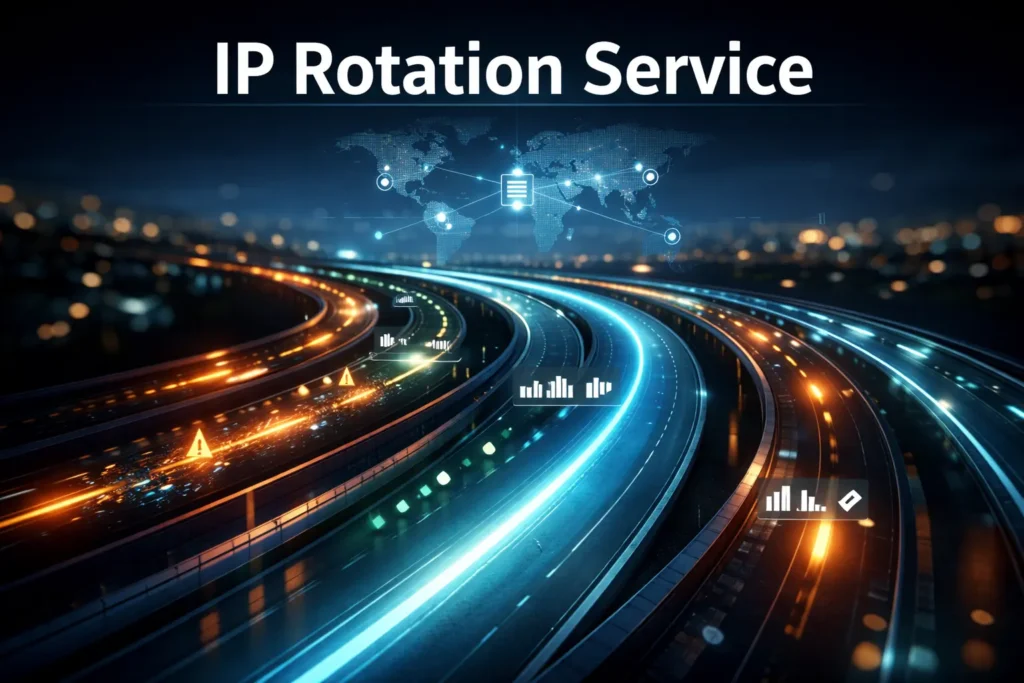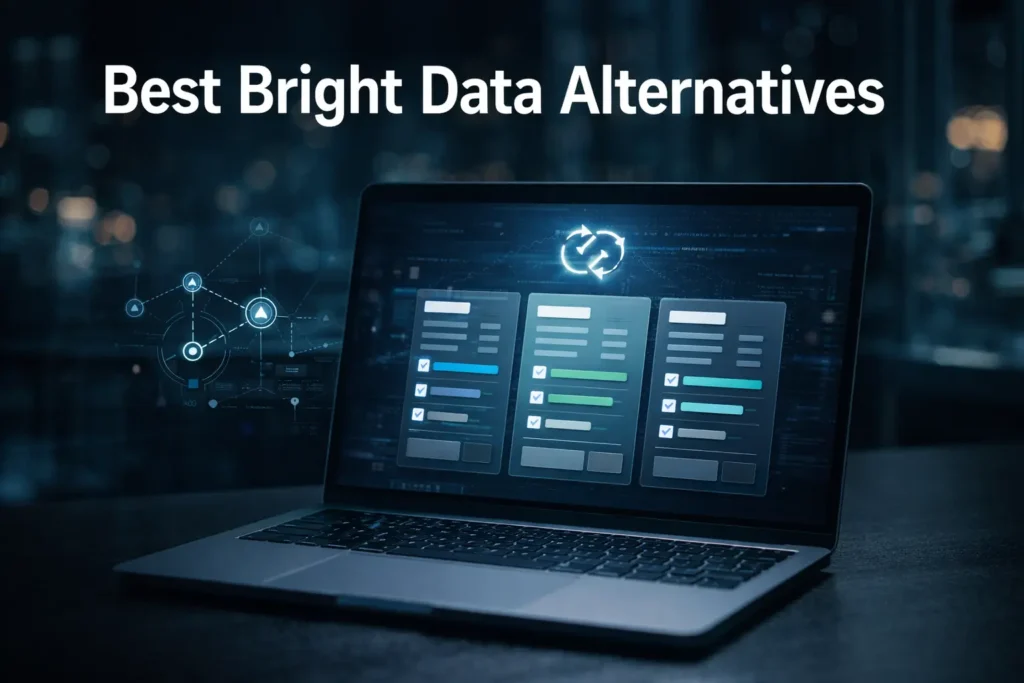With 78% of Fortune 500 companies leveraging proxy networks for secure browsing and automated data extraction, the ability to navigate the web anonymously, harvest data efficiently, and bypass geo-restrictions has become indispensable for businesses of all sizes and tech-savvy individuals alike. This is where cheap rotating datacenter proxies enter the fray, offering anyone the opportunity to enhance their online operations without breaking the bank.
Unlike static proxies, rotating datacenter proxies offer the advantage of switching IP addresses, thereby significantly reducing the risk of detection and banning by target websites.
Their cost-effectiveness, combined with high-speed connectivity and reliability offered by reputable proxy providers, makes them an appealing choice for a wide range of online activities, including web scraping, geo-targeting, and managing high traffic volumes across various network configurations.
What Are Rotating Datacenter Proxies?
Table of Contents
ToggleDedicated servers within data centers host rotating datacenter proxies and are a product of virtual private servers (VPS). These proxies generate datacenter IP addresses and possess a massive IP proxy pool, allowing for rapid connection speeds and the ability to handle voluminous requests simultaneously.
Definition and Functionality
A rotating datacenter proxy changes its IP address with each connection request, combining the high performance of datacenter proxies with dynamic IP rotation. This feature significantly reduces the risk of detection and blocking by target websites.
They are not affiliated with an Internet Service Provider (ISP), making them faster and more affordable than residential proxies.
Benefits
Rotating datacenter proxies are ideal for tasks requiring a vast number of IP addresses quickly, such as large-scale data extraction operations. They are generally more affordable and provide a budget-friendly option for many online activities.
Over 2.5 billion pages were scraped monthly using proxy infrastructure in 2024, with datacenter proxies being the primary choice for high-volume operations.
Source: Market Growth Reports
Their ability to rotate IPs helps reduce ban rates and enhances anonymity, making them perfect for managing high traffic volumes across various network configurations.
Common Uses
Companies use these proxies to anonymously gather intelligence about competitors, monitor price changes, and evaluate marketing strategies. SEO professionals utilize them to track search engine rankings and analyze competitors’ SEO strategies without bans or blocks.
Additionally, advertisers employ rotating datacenter proxies to check ad displays in different regions anonymously. They are also used to manage multiple social media accounts for marketing purposes without the risk of getting flagged or banned.
Also read: Top 5 Best Rotating Datacenter Proxies
Advantages of Cheap Rotating Datacenter Proxies
Cost-Effectiveness
Cheap rotating datacenter proxies are notably more affordable than their residential counterparts due to economies of scale in maintaining data centers.
| Feature | Rotating Datacenter Proxies | Residential Proxies |
|---|---|---|
| Infrastructure Source | Data centers with dedicated servers and high-speed fiber optic networks | Real residential devices connected to ISP networks |
| Economies of Scale | ✓ Centralized infrastructure ✓ Bulk IP generation ✓ Shared server costs ✓ Lower maintenance overhead | ✗ Distributed network ✗ Individual device costs ✗ Higher acquisition costs ✗ Complex maintenance |
| Speed | 100 – 1000 Mbps Response time: 0.3s – 0.6s | 10 – 100 Mbps Response time: 1s – 3s |
| IP Pool Size | Thousands to millions Easy to scale quickly | Millions (but more expensive) Limited by device availability |
| Success Rate | 20% – 50% (depending on target) Higher detection risk | 85% – 95% Lower detection risk |
| Best Use Cases | • Large-scale web scraping • High-volume data extraction • SEO monitoring • Price tracking • Market research | • Social media management • E-commerce monitoring • Ad verification • Sneaker copping • Bypassing geo-restrictions |
| Setup Complexity | Simple – instant deployment List-based configuration | Moderate – requires gateway setup API-based configuration |
| ROI for High-Volume Tasks | Excellent 3-10x cheaper for bulk operations | Good Better for quality over quantity |
| Recommended For | Budget-conscious businesses, startups, developers, data analysts | Enterprise clients, sensitive operations, premium use cases |
These facilities are equipped with advanced technology infrastructure, shared among numerous clients, thereby spreading out the cost.
Speed
Datacenter proxies offer superior speed compared to residential proxies because they are hosted on dedicated servers that ensure a high-speed connection. When working on time-sensitive tasks, having a reliable and consistent connection is of the utmost importance.
The advanced hardware used in datacenters contributes to this enhanced performance, making these proxies ideal for jobs that demand quick response times.
Availability of IP Addresses
One of the primary advantages of rotating datacenter proxies is the vast pool of IP addresses they provide. This large pool allows users to handle voluminous requests simultaneously and efficiently.
Web scraping and data harvesting rely on the ability of proxies to rotate their IP addresses with each request. This feature greatly reduces the chances of detection and IP blocking.
Flexibility
Rotating datacenter proxies offer remarkable flexibility in managing online activities. They allow for configuration changes such as IP rotation frequency, which can be set from each connection request to every 30 minutes, depending on the user’s needs.
This flexibility is advantageous for managing multiple tasks, from SEO monitoring to competitive intelligence gathering, making these proxies a versatile tool for various online operations.
Also read: Why Choose Rotating Datacenter Proxies with Unlimited Bandwidth?
Potential Drawbacks
While cheap rotating datacenter proxies offer numerous benefits, they also come with certain drawbacks that users should consider.
Detection Risks
Datacenter proxies are not affiliated with an Internet Service Provider (ISP) and often originate from cloud hosting services. This may cause some target websites to flag these IP addresses.
Targets may take precautionary measures against these IPs, potentially leading to increased detection and blocking rates. When tasks like gathering competitive intelligence depend on remaining anonymous and untraceable, this becomes an even greater obstacle.
Shared Use Concerns
Rotating datacenter proxies may be shared among multiple users, which can affect performance and risk exposure. Since many people are using these proxies, the IP addresses may become overused, increasing the likelihood that websites checking for proxy use will detect and block them.
This shared nature can also lead to slower internet connections compared to static proxies, which do not change IP addresses frequently.
Furthermore, the need for sticky sessions in use cases where you require a consistent IP address poses a challenge with rotating proxies. IP rotation can compromise tasks like managing social media accounts or carrying out in-depth automated tests, necessitating the use of static, or sticky, proxies for some applications.
Users must take these factors into account when making a decision so that they can select the most appropriate proxy service for their needs, taking into account both cost and risk.
Also read: Shared vs Dedicated Rotating Datacenter Proxies: Which is Better?
Conclusion
Users should weigh the advantages against the potential drawbacks, considering both the high-speed, cost-efficient benefits and the challenges associated with detection risks and shared usage.
Making an informed decision entails a comprehensive understanding of these factors, ensuring that the selected proxy solution aligns with specific operational needs and objectives.
For those looking to deepen their understanding and explore further into the world of cheap rotating datacenter proxies, consider reading our article on Datacenter Proxies with IP Rotation, which expands upon the nuances of rotating IPs and their strategic use in overcoming digital hurdles.
FAQs About Cheap Rotating Datacenter Proxies
Q1. How much do rotating datacenter proxies cost?
Rotating datacenter proxies at KocerRoxy are highly affordable, starting from as low as $6 per day with unlimited bandwidth. They’re significantly cheaper than residential proxies because data centers share infrastructure costs among multiple clients. This makes them cost-effective for businesses and individuals running high-volume online activities without compromising performance.
Q2. Why are rotating datacenter proxies more cost-effective than residential proxies?
Rotating datacenter proxies are generally more affordable because data centers host them with advanced technology infrastructure, shared among multiple clients.
This sharing spreads out the cost, making them cheaper than residential proxies, which are tied to ISP connections and typically cost more to maintain.
Q3. How can you mitigate detection risks with rotating datacenter proxies?
To mitigate detection risks, users can select high-quality proxy providers that regularly update their IP pools, use advanced techniques to mask proxy usage, and configure IP rotation frequency based on specific needs. Using a combination of rotating and static proxies can also help manage tasks that require consistent IP addresses.
Q4. Are cheap rotating datacenter proxies reliable for web scraping?
Yes, rotating datacenter proxies are highly reliable for web scraping due to their ability to switch IP addresses frequently, reducing the risk of detection and blocking. Their high speed and large IP pool make them suitable for handling voluminous requests efficiently.
Q5. Who should use rotating datacenter proxies?
Businesses conducting web scraping, competitive intelligence, SEO monitoring, price tracking, and ad verification benefit most from rotating datacenter proxies. Social media managers handling multiple accounts and digital marketers analyzing regional campaigns also find them valuable due to their speed, affordability, and large IP availability.
How useful was this post?
Click on a star to rate it!
Average rating 0 / 5. Vote count: 0
No votes so far! Be the first to rate this post.
Tell Us More!
Let us improve this post!
Tell us how we can improve this post?


